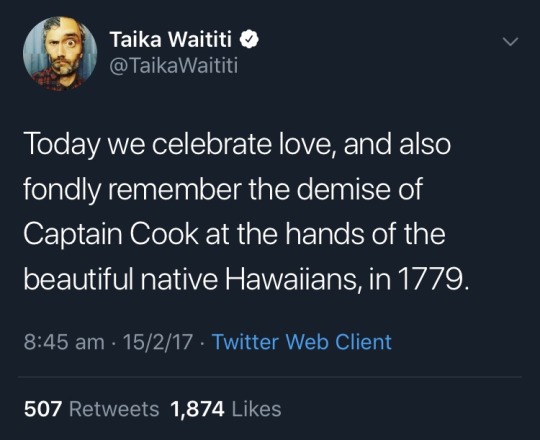Text
Relatedly, the most reliable way to tell New Zealanders and Australians apart isn't how we pronoun "fish and chips", it's whether we can say the word "whakapapa" a) accurately and b) without thinking it's funny.
(Link for pronunciation)
i do desperately need everyone on this website especially people who arent american but want to rag on america to familiarize themselves with the basic romanized spelling conventions of native american languages because every day i come on here and i see people making fun of massachusetts or connecticut or mississippi or passamaquoddy or mashpee or nipissing and its like PLEASE. PLEASE THEY ARENT ENGLISH WORDS. PLEAAAAASEEEEEUUUHHH. USE YOUR MINDS TO IDENTIFY WHEN A WORD LOOKS LIKE IT MAY NOT BE ENGLISH. I DONT CARE IF YOU MAKE FUN OF AMERICA JUST PLEASE STOP BEING RACIST WHILE YOU DO IT
42K notes
·
View notes
Text
if you give “stupid” characters rural/southern accents i don’t like you and if you give “smart” characters rural/southern accents but it’s a punchline i don’t like you even more
40K notes
·
View notes
Text
Warner Brothers Discovery has struck again... Aotearoa has two TV news sources, one of which is state-owned and the other (Newshub) which is owned by WBD. On Thursday they announced that they're shutting down all local news on their platform - not just the current affairs programmes, everything. Even the 6pm news.
Personally I haven't voluntarily watched TV news for about 20 years, except election night coverage, but it's where a lot of people still get their news, and it's important to have more than one source. And Newshub / TV3 have done some great work over the years, most notably exposing the unjust conviction of Teina Pora.
TV in Aotearoa is run on a shoestring anyway, and now apparently we can't even afford shoestrings. Fuck.
122 notes
·
View notes
Text
Right, considering the current state of corporate politics on this site, and that it seems that only those affected seem to be actively speaking on the matter, it is up to I, the only fucking cishet on tumblr, to drag this out to a wider audience.
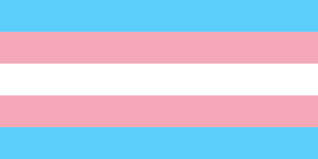
REBLOG IF YOUR ACCOUNT IS A TRANSFEM SAFE SPACE.
We need to show these higher ups how much we truly value them.
66K notes
·
View notes
Photo
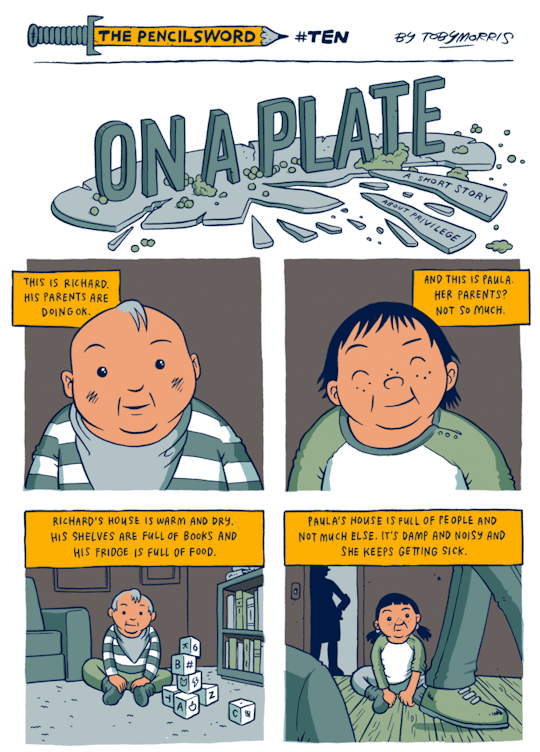
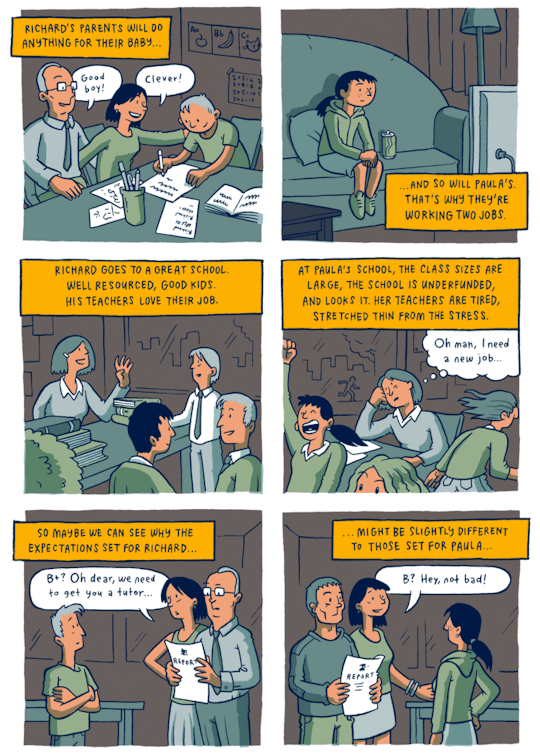


The Perfect Explanation of Privilege – In One Powerful Punchline
“The Pencilsword” is a comic strip by Toby Morris, an illustrator from New Zealand. His most recent comic, “On a Plate” hits hard at the heart of the issues of concerning wealth and privilege.
How many times have you heard the “I’ve never been handed anything on a platter” argument in regard to social security and other social benefits?
Toby wrecks this argument by showing how two children can grow up, be loved and supported, and yet still have two very different outcomes.
Make sure to follow all the way to the end for the powerful punchline. This comic is an increasingly sad reality for far too many of this nation’s children and families.
356K notes
·
View notes
Text
vimeo
today we lost the great Efeso Collins, during a charity event to raise funds for clean drinking water for children in the pacific. here is his incredible parliamentary maiden speech from just last week (transcript below). i encourage you to listen, and if you can, donate to childfund's water fund here
It is an indescribable feeling to stand up and address this House. As a son of Samoan immigrants who made the mighty Ōtara 274—Southside hard—their home, I am well aware of the giants whose shoulders I stand on and the masters whose feet I learnt at. The courage, foresight, entrepreneurial spirit, and hope of our ancestors who journeyed thousands of years ago through the vast waters of Te Moana-nui-a-Kiwa brings me here today.
My parents arrived in New Zealand in the early 1960s, told that this was the land of milk and honey. Dad started off as a taxi driver with South Auckland Taxis, and mum on the factory floor at New Zealand Forest Products in Penrose. We lived in a four-bedroom State house on Preston Road in Ōtara, and I attended local schools: East Tāmaki Primary, Ferguson Intermediate, and the great Tangaroa College. We're forever grateful for the State house that was our home for around 20 years, and the quality public education we received from our local State schools.
I did try my hand for a short period at a decile 10 school outside of Ōtara, but that experiment lasted only two weeks. It was during the time in the late 1980s, when families from poorer areas were being discouraged from going to local schools because they weren't considered up to scratch. I'm glad we changed course and decided to high school it in Ōtara, where the motto of our school was "Waiho i te tokā tu Moana"—"Steadfast like a rock in the sea".
Later, at university, I went on to write my Master's dissertation on brown flight, critiquing the Picot reforms that have wreaked havoc on our public schooling system. That period was also a challenging time for my family because we were being told by our teachers to stop speaking Samoan at home and only to speak English. My parents didn't want us to fail at school, so we were allowed to speak English at home and over time we stopped speaking Samoan altogether. In the end, I lost my language. I struggled, I was embarrassed, and I felt incomplete. Even speaking to you in Samoan this evening gives me major tremors.
There's a saying in Samoan: "E le tu fa'amauga se tagata"—no one stands alone, no one succeeds alone—and, for me, no one suffers alone. Over the past years, with the support of my family and friends, I've taken to trying to converse again in Samoan, reading more texts in Samoan, praying in Samoan, and sending our youngest to a local Samoan early childhood centre. Our beautiful language, Gagana Samoa, has returned to our home and is helping to overcome the inadequacy that had taken root in my soul.
As I speak this evening, I'm mindful of the many young people who are navigating these at times treacherous and unsettled waters in life, filled with so much potential, energy, and hope, yet too often misunderstood. In my time as a youth worker in South Auckland, I've spoken with hundreds of young people with massive dreams for the future. We need youth workers, we need social workers, and we need mentors to walk alongside our young people, and, yes, we want our youth to be responsible and caring and considerate. So it's our job in this House to resource the people and organisations who will model the behaviour to them that we expect, but who also won't give up on them and won't come with a saviour mentality.
Many of our societal challenges are driven by poverty. We can achieve greater social cohesion and lift our sense of belonging by addressing poverty. I've been honoured to run youth mentoring programmes for nearly 25 years—that's about how old I am—and to this day I mentor young people. When we undertook and published research on youth gangs some years ago, the youth we spoke to had the solutions and just needed the means to make it happen. Too many of our young people are filling our prisons, and it is wasted human potential. Give them the tools, the resources, and the means to make a meaningful contribution to the world, and they will. I was at a conference recently about the threats to democracy and an attendee spoke about their work in developing nations and used the familiar retort, "You can't eat democracy." And I couldn't agree more. This House, this centre of democracy, needs to do more to engage our people, all of our people, so that they can see this House is not just relevant but an essential part of their lives.
The greatest challenge facing our generation is climate change. The Pacific Islands nations are among the most vulnerable to climate change in the world. The world's continued reliance on fossil fuels, loss of coral reefs, rising sea levels, and increasing severe weather patterns means that our extended whānau in the Pacific are in immediate danger. We, as a collective, must do all we can to do as we say out south "flip the script". Truth is, those who've done the least to create this predicament are being the hardest hit. Our challenges, whether ecological, geopolitical, or cultural, are diverse, but we're bonded by the inextricable ties we have to our lands and our oceans. We've inherited philosophies, knowledge systems, and profound ecological wisdom that holds the answers and drives our collective resilience—from West Papua to Hawai'i. Our fight for a climate resilient, nuclear-free and independent Pacific remains as strong as ever. We are not drowning; we are fighting.
I haven't come to Parliament to learn—learning happens as a matter of course through reflection. I've come to this House to help. Helping is a deliberate act. I'm here to help this Government govern for all of New Zealand, and I'm here to open the door, enabling our communities to connect better with this House. During the election campaign, I spoke to people frustrated about their lot in life, scared for their and their children's futures, and feeling their dreams were slipping away. The people I spoke to expect the Government to do more and move faster. And I know that there are some in this House who believe Government is not the answer to these challenges and that less Government is better. But here's the thing: the Government cannot be a bystander to people suffering confusion and disenfranchisement. New Zealand must close the divide between those who have and those who have not, because the reality for my community is that those who have more money often wield more power, more health, more housing, more justice, more access, more canopy cover, more lobbyists with swipe cards, and more time. And the opposite is true for those who have fewer resources.
It's hard to be poor, it's expensive to be poor, and moreover, public discourse is making it socially unacceptable to be poor. Whether it's bashing on beneficiaries, dragging our feet towards a living wage, throwing shade on school breakfast programmes, or restricting people's ability to collectively bargain for fairer working conditions, we must do better to lift aspirations and the lived realities of all our people. To that end, I want to say to this House with complete surety that the neoliberal experiment of the 1980s has failed. The economics of creating unemployment to manage inflation is farcical when domestic inflation in New Zealand has been driven by big corporates making excessive profits. It's time to draw a line in the sand, and alongside my colleagues here in Te Pāti Kākāriki, we've come as the pallbearers of neoliberalism, to bury these shallow, insufferable ideas once and for all. And this, sir, is our act of love.
Paolo Freire, in his seminal work Pedagogy of the Oppressed, said love is an act of courage, not fear; love is a commitment to others. No matter where the oppressed are found, the act of love is a commitment to their cause, the cause of liberation. The most recent election campaign left many in our Māori communities bruised and targeted for the perceived privileges supposedly bestowed upon them. Shared governance is a rich concept about how we include those who've been excluded for far too long in the work of this House and the democratic institutions that are fundamental to our collective wellbeing. We are Tangata Tiriti and we have nothing to fear. As a New Zealand-born Samoan living in South Auckland, I've experienced, written about, and spoken about racism in this country. I've also been on a well-publicised journey in understanding the needs and views of our rainbow communities, and I have a long way to go. And my message to whānau who often experience the sharp end of discrimination—disabled, ethnic, rainbow, brown, seniors, and neurodiverse—is thank you for trusting us with the responsibility of facilitating a new discussion on how we move forward together and make possible what was once deemed impossible.
The American civil rights activist James Baldwin said, "Not everything that is faced can be changed, but nothing can be changed until it is faced." We commit to working across this House as a nation and with each other irrespective of our post code, income bracket, skin colour, or level of qualification attained. But, in order for that work, we must come with humility, the desire to listen, and dare I say it, maybe speaking last. If I was to inspire anyone by getting to this House and my work over the next three years, I hope that it's the square pegs, the misfits, the forgotten, the unloved, the invisible—it's the dreamers who want more, expect more, are impatient for change, and have this uncanny ability to stretch us further.
199 notes
·
View notes
Text
When I went to Japan I kept wanting to speak te reo Māori because my brain was all "oh a language that is not English, kei te pai". Fortunately the Japanese and Māori words for yes sound fairly similar, so the one time I actually spoke te reo by accident, no-one noticed.
Two weeks later, and still in Japan, I apologised to someone in French for some fucking reason.
i love the strange reality of being a human person with a human brain. one time someone said something to me in a foreign language (japanese, which i do not speak) and i automatically responded in a different foreign language (spanish, which i do not speak well) and then we both said "what?" in english, an experience made more surreal by the fact that everyone around us was speaking loudly in canadian french (as this occurred in Quebec)
55K notes
·
View notes
Text
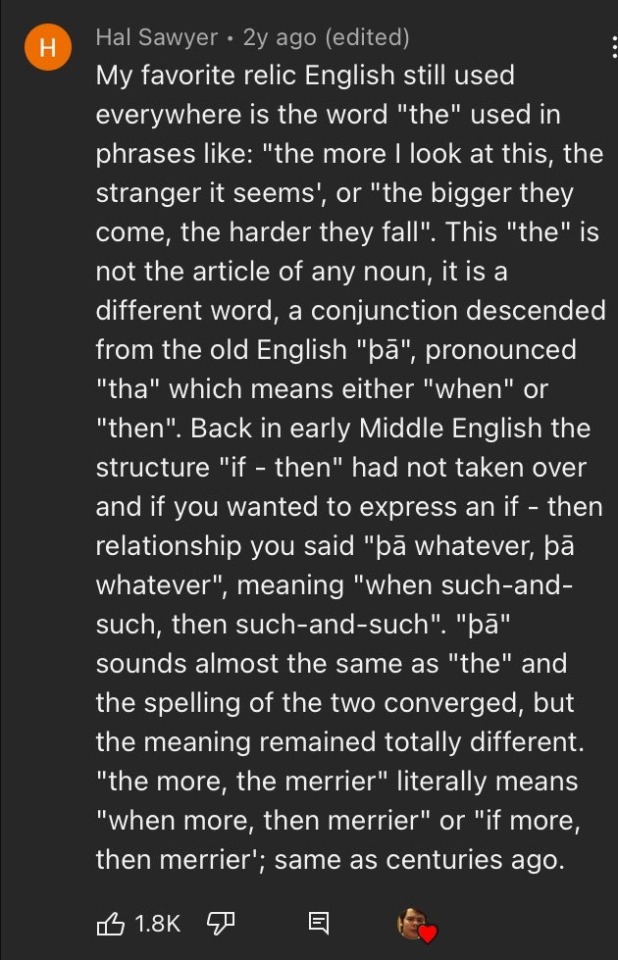
[ID: youtube comment from Hal Sawyer:
My favorite relic English still used everywhere is the word "the" used in phrases like: "the more I look at this, the stranger it seems, or "the bigger they come, the harder they fall". This "the" is not the article of any noun, it is a different word, a conjunction descended from the old English "þā", pronounced "tha" which means either "when" or "then". Back in early Middle English the structure "if - then" had not taken over and if you wanted to express an if - then relationship you said "þā whatever, þā whatever", meaning "when such-and- such, then such-and-such". "þā" sounds almost the same as "the" and the spelling of the two converged, but the meaning remained totally different. "the more, the merrier" literally means "when more, then merrier" or "if more, then merrier'; same as centuries ago.
end ID]
this is so cool
66K notes
·
View notes
Text
In light of Duolingo laying off its translators, here are my favourite language apps (primarily for Mandarin Chinese, Japanese, and te reo Māori).
Multiple Languages
Anki is a flashcard programme and app that's not exclusively for languages. While making your own decks is ideal, you can also download shared decks for most languages.
If you're learning Japanese, specifically, Seth Clydesdale has websites for practicing alongside Genki's 2nd or 3rd editions, and he also provides his own shared Anki decks for Genki.
And if you're learning te reo Māori, specifically, here's a guide on how to make your own deck.
TOFU Learn is an app for learning vocabulary that's very similar to Anki. However, it has particularly excellent shared decks for East Asian languages. I've used it extensively for practicing 汉字. Additionally, if you're learning te reo Māori, there's a shared deck of vocabulary from Māori Made Easy!
Mandarin Chinese
Hello Chinese is a fantastic app for people at the HSK 1-4 levels. While there's a paid version, the only thing paying unlocks is access to podcast lessons, which imo are not really necessary. Without paying you still have access to all the gamified lessons which are laid out much like Duolingo's lessons. However, unlike Duolingo, Hello Chinese actually teaches grammar directly, properly teaches 汉字, and includes native audio practice.
Japanese
Renshuu is a website and app for learning and practicing Japanese. The vast majority of its content is available for free. There's also a Discord community where you can practice alongside others.
Kanji Dojo is a free and open source app for learning and practicing the stroke order of kanji. You can learn progressively by JLPT level or by Japanese grades. There's also the option to learn and practice kana stroke order as well.
10K notes
·
View notes
Text
mood
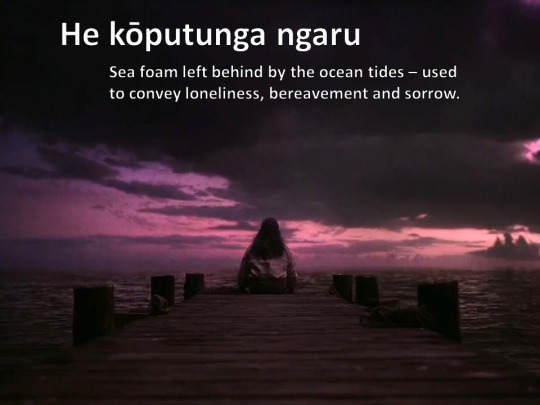

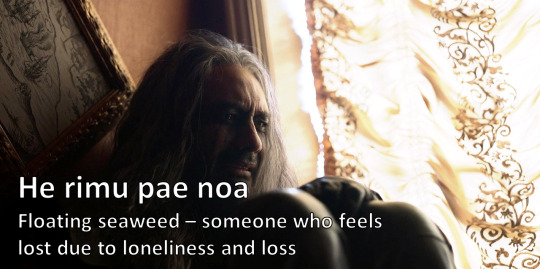
sorry not sorry
(Kupu whakarite from Hona Black's He Iti Te Kupu: Māori Metaphors and Similes, buy the book)
293 notes
·
View notes
Text
if everyone in the world was always so niceys i'd totally dox myself and see who comes to hang out. alas there is evil in the world yet
57K notes
·
View notes
Text

He's your Santa now, bitch 😁
Fangta Claus, aka Fang (aka Kevin) from Our Flag Means Death
70 notes
·
View notes
Text
thrash metal / kapa haka is one of those crossovers that as soon as you here it you wonder why it (apparently) hasn't been done before
Our ancestors gather to support us
Our magicians prepare the spells
This is the work of Tūmatauenga
Behold
youtube
53 notes
·
View notes
Text
I love OFMD for many reasons, from genuinely fantastic writing to a great story to amazing acting to wonderful poc and queer characters, but I think the single best thing OFMD has done for me on a tangible level is giving me a little something I like to call the Stede Bonnet Test.
The Stede Bonnet Test is very simple. If I'm about to do something that harms no one but would make me happy and feel like a more authentic version of myself, and I start talking myself out of it because I remember how other people might describe this thing as cringey or stupid or I'm reacting from a place of internalized homo/transphobia, then I ask myself: "would the narrative punish Stede Bonnet in this situation if he walked away?" and if the answer is yes, then I do that thing.
For example, when I was replacing my old set of kitchen knives and I was considering getting new ones that have a cute flower design I really loved, I almost talked myself out of it because I didn't think they were very 'manly.' When I caught myself and applied the Stede Bonnet Test, I concluded that yes, Stede Bonnet absolutely should buy these knives or the narrative would punish him, probably by stabbing him with one of the more 'manly' knives he bought instead. So I bought the knives and they still make me smile every time I use them.
It's improved my life in real, tangible ways. My house is decorated more in the style I like, not what I think it should be like. I spend more of my free time on hobbies I love. I spend more time with my friends. I strongly recommend it.
1K notes
·
View notes
Text
kia ora! i would like to suggest the coining of a term that would hopefully help a large demographic of mostly-forgotten-about māori to connect with each other and share our experiences to feel less alone, congregate around a concept regardless of country of origin and upbringing, and organise as activists.
i politely ask as many people to spread this as possible to help indigenous people organise with each other and to get the largest amount of interactions possible.
anyway, with all that being said,
i would like to coin the term "ngāti rangiātea" for māori who do not know their iwi to use.
this is based on the well known whakataukī/proverb, "i will never be lost, for i am a seed which was sown from rangiātea." i chose this whakataukī due to the spiritual significance of rangiātea as a place in māori culture, as well as to emphasise that no matter how it feels, we are not lost, we can find ourselves in each other, we can experience strength and self-realisation, and that we will exist with mana and without whakamā as rightful tangata whenua.
i've put my reasoning, personal experiences shaping my viewpoints on the matter, and various statistics under the cut to make this post reblog-friendly and i would suggest fellow māori read it regardless of whether or not they know their iwi. i also ask for the opinions of other māori, ESPECIALLY AND SPECIFICALLY other māori who do not know their iwi. in fact, i politely ask māori to share this with their whānau and people in general to share this with māori they know, especially any they know who do not know their iwi. a wide reach is what i am going for to get the largest amount of voices, critiques, and opinions on the topic and to avoid this from just becoming a very small thing that stays in an online echo-chamber.
to begin, the 2018 aotearoan census shows that, of the 775,836 people identifying as māori in aotearoa, roughly 17% are unable to identify their iwi in the census. this has gone up by 1% since 2006, showing that we are a considerably stable percentage of people. along with this, there are more than 170,000 māori living in australia and, while there are no solid statistics, there are an estimated 8,000 māori living in the UK, 3,500 in the US, 2,500 in canada, and 8,000 in other countries where there's no option for māori or any polynesians on the census.
this number adds up to 967,816 total māori and while there's no census in these countries asking for your iwi, i would go as far as to assume that there's a larger number of diaspora māori who are no longer able to identify their iwi than there are in aotearoa. of course, this is just speculation based on my lived experiences and conversations with other diaspora māori, however even assuming that it's the exact same amount globally, 17%, this is roughly 164,532 māori worldwide who do not know their iwi. nearly one in five māori do not know their iwi.
regardless of the specific statistics, the hard fact here is that there is a large percentage of māori who are unsure of their iwi for whatever reason. it's extremely easy to feel unsure of yourself, lost, disconnected, and uncomfortable speaking on issues regarding te ao māori when you're unsure of your iwi (or your hapū, whānau, waka, or anything else, but there is heavy emphasis on the iwi) and it's very easy for whakamā to take hold, especially when many māori who can recite their whakapapa aren't very polite or understanding about your situation to say the least.
and there are a lot of those people.
unfortunately, i've spoken to many māori who are of the opinion that not knowing your iwi due to colonialism, assimilation, forced disconnection, etc. means that you should not, cannot, call yourself māori. this is a disgusting viewpoint to have and in my opinion it spits on the fundamental concepts of māori culture and worldviews. thankfully this is a small yet vocal group of people, but even so, they add to the collective experience that makes it extremely difficult to navigate a world while full of whakamā and internalised racism. it can feel like there's no space for you, no term you can use, nobody you can relate to, no mana you can claim, nothing. when you cannot recite your whakapapa, it can feel like there's a part of you that's fundamentally missing.
as well as this, even when people mean well, when you are in this situation, you're usually told to just do some genealogy work, do some research, ask your family what they know. sometimes, these steps are simply not possible. other times, we've already done everything suggested over and over and over again. we're generally told "oh, that sucks, but one day you'll find out, keep looking!" in response to our lack of iwi. sure, they mean well, but i have never once been told anything along the lines of "that's okay, some things are lost to time through no fault of your own. don't beat yourself up over something your whānau had to hide to survive, what you do now to uphold your family's mana, what you do know about your whānau, and who you ultimately become is more important than what you no longer know."
and why? why is it seen as shameful to say matter-of-factly that i don't know my iwi? i'm not looking for comfort, i'm not looking to be told that, aww, there there, i'll find it eventually. i'm stating a fact. i do not need pity, i need my mana and voice to be respected.
this concept is what i want to emphasise by coining ngāti rangiātea. some things are lost to time, but we aren't. our loss of knowledge does not mean that we are unworthy of being māori, that we are unworthy of basic human respect. it does not mean that we have lost everything that our whānau knows. it is a scar, a reminder of what colonisation took from us, yes, but we cannot allow it to continue to be an open bleeding wound. we will not be lost to time and we should not bow our heads and act like we do not exist, that we're inconvenient, that we damage the "image" that māori have. in fact, we are an important aspect of māori culture and ignoring our existence does harm to everybody.
and of course we can't speak on some topics regarding te ao māori. this seems to be a topic that comes up frequently as a strawman. yes, there are some topics that would be irresponsible to speak on when we have no experience with them. this doesn't mean we can't speak on anything. having a collective identity, an "iwi" to congregate around even just politically, would help us speak on topics that we are more qualified to speak on than māori with knowledge of their iwi (yes, those topics exist, shockingly.)
we will never be lost, for we are a seed sown in rangiātea.
by identifying as ngāti rangiātea, i wish to emphasise that it's important to accept that sometimes, someone just won't be able to find every piece of information. loss of family knowledge is literally one of the primary goals of forced assimilation! we all went through it as colonised peoples, why must we continue to attach shame to those of us who were forced to obfuscate our history to keep our children alive? it's not a personal flaw, it's not a dirty secret, it's a fact of life that must not continue to be kept quiet out of shame, and the sooner we can focus on healing this subsection of our community, the stronger māori as a whole will become.
so, this is why i'd like to coin a term for māori who are unsure of their iwi. this is what i intend to achieve by giving us a name, our own "iwi" to congregate around, to identify ourselves as. instead of hanging my head and saying "i'm not sure what my iwi is, i'm sorry", instead of feeling inclined to beg like a dog to be treated with respect, i would like to look people in the eye and tell them that i am ngāti rangiātea. i would like this label to be synonymous with strength and not shame, that i refuse to let my whakamā swallow me, that i am just as worthy of calling myself māori as anyone else, that there are many others in my iwi (or lack thereof). i would like other people to have that as well and i would like those like me to feel less lost when all they've been told is "well, you'll learn your iwi eventually!" as if that's going to help someone feel better if they can't find their iwi.
and even if a person finds their iwi eventually, it's absolutely disgraceful that people are treated that they're not allowed to access many basic parts of te ao māori until they discover something they are not even 100% destined to find. i think that this view contributes to a lot of people who eventually find their iwi becoming unnecessarily arrogant towards those who truly cannot find this information, that they're just not putting enough effort in. if a person finds their iwi after identifying as ngāti rangiātea, they are fully welcome to continue to identify as this political label along with the iwi they now know they belong to as i wish for it to be a term that describes your experiences, your upbringing, and your community. you don't suddenly lose your whānau or your lived experience when you discover your whakapapa.
finally, this hopefully goes without saying, but ngāti rangiātea is not meant to function as a real existing iwi does. the term will hopefully be used as a way to identify yourself and other people and organise but i don't expect nor do i want this to be treated like a coordinated iwi. i expect and hope for this to be a decentralised way of identifying and experiencing community to make it easier to organise as a people. think of this the way the terms ngāti kangaru, ngāti rānara, ngāti tūmatauenga etc. are used.
-----
so, the tl;dr is that i feel like coining a name for a phenomenon that nearly one in five of all māori experience in quiet shame, to make it easier for us to congregate and find each other, speak on our experiences, organise as activists, feel less lost, and ultimately give us the ability to regain our mana as a community with shared goals and experiences. i have spoken to many māori who feel this way and my suggestion for this term is ngāti rangiātea, to show homage to the well known whakataukī, "i will never be lost, for i am a seed sown from rangiātea", to give us a community to work with, and to give us an "iwi" to list when asked instead of fumbling for words and feeling whakamā.
i would like to take the emphasis off of constantly looking to the future for what you may or may not even find with this identity. we are not broken, we are not lost, for we are seeds sown in ngāti rangiātea.
tēnā koutou, tēnā koutou, tēnā tatou katoa, and if you got this far, thank you for reading.
365 notes
·
View notes

